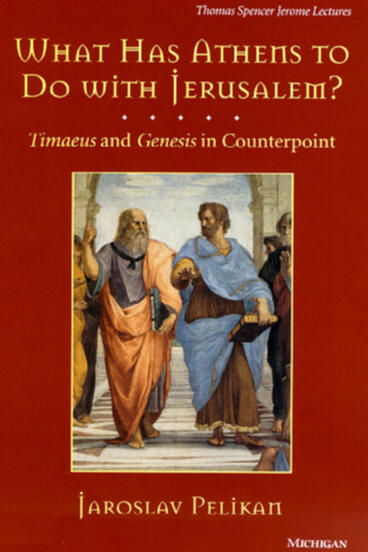What Has Athens to Do with Jerusalem?
Timaeus and Genesis in Counterpoint
An important contribution to early Christian studies
Description
The debate about evolution and creationism is striking evidence of the tensions between biblical and philosophical-scientific explanations of the origins of the universe. For most of the past twenty centuries, important historical context for the debate has been supplied by the relation (or "counterpoint") between two monumental texts: Plato's Timaeus and the Book of Genesis.In What Has Athens to Do with Jerusalem?, Jaroslav Pelikan examines the origins of this counterpoint. He reviews the central philosophical issues of origins as posed in classical Rome by Lucretius, and he then proceeds to an examination of Timaeus and Genesis, with Timaeus' Plato representing Athens and Genesis' Moses representing Jerusalem. He then follows the three most important case studies of the counterpoint--in the Jewish philosophical theology of Alexandria, in the Christian thought of Constantinople, and in the intellectual foundations of the Western Middles Ages represented by Catholic Rome, where Timaeus would be the only Platonic dialogue in general circulation.Whatever Plato may have intended originally in writing Timaeus, it has for most of the intervening period been read in the light of Genesis. Conversely, Genesis has been known, not in the original Hebrew, but in Greek and Latin translations that were seen to bear a distinct resemblance to one another and to the Latin version of Timaeus. Pelikan's study leads to original findings that deal with Christian doctrine in the period of the church fathers, including the Three Cappadocians (Basil of Caesarea, Gregory of Nazianzus, and Gregory of Nyssa) in the East, and in the West, Ambrose, Augustine, and Boethius. All of these vitally important authors addressed the problem of the "counterpoint," and neither they nor these primary texts can become fully intelligible without attention to the central issues being explored here.What Has Athens to Do with Jerusalem? will be of interest to historians, theologians, and philosophers and to anyone with interest in any of the religious traditions addressed herein.
Jaroslav Pelikan is Sterling Professor Emeritus of History, Yale University and President of The American Academy of Arts and Sciences.
Reviews
". . . Pelikan's study is interesting and provides a good entrance point to issues of cosmogony and how they are addressed by the Greek, Hebrew, Hellenistic, and Christian traditions."
- David Rehm, Mount Saint Mary's College
--David Rehm, Mount Saint Mary's College, Ancient Philosophy, Volume 19, 2000
"This volume is no less relevant than it is fascinating. The public school systems in the United States have throughout the twentieth century struggled with the so-called creation-evolution debate. The tension and 'counterpoint' between a theological and a philosophical/scientific account of the origin of the world and of the human race seems perennial. Pelikan goes to the root of this debate by pairing Moses and Plato in this intriguing review of Genesis and Timaeus. . . . The book is valuable for theological libraries and for research scholars in Patristics and Medieval Studies. Theologians interested in the doctrine of the Trinity will find Pelikan's final chapter especially interesting."
- Faith & Mission
--Faith & Mission
"Pelikan brings his usual mastery and eloquence to each of these essays. Each can be read alone as commentary on selected passages of the Timaeus; likewise, each essay contains valuable insights into the history of cosmology. This is a highly recommended work for anyone interested in a better understanding of the Athens-Jerusalem question in general as well as the history of cosmogonic speculation in particular."
- David Vincent Meconi, S.J., Xavier University
--David Vincent Meconi, S.J., Xavier University, Review of Metaphysics
". . . the book is plainly not intended as a scholarly exercise in the history of ideas. It is more like a musical composition consisting of concepts rather than notes, and as such, a staggering tour de force. My recommendation is: take it, read it and enjoy it!"
- David Runia, Univ. of Leiden
--David Runia, Univ. of Leiden, Studiea Philonica Annual 12, 2000
Winner: Modern Language Association's 1998 Conference on Christianity and Literature Book Award
- Modern Language Association

